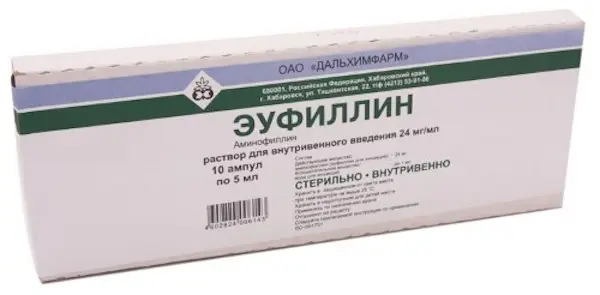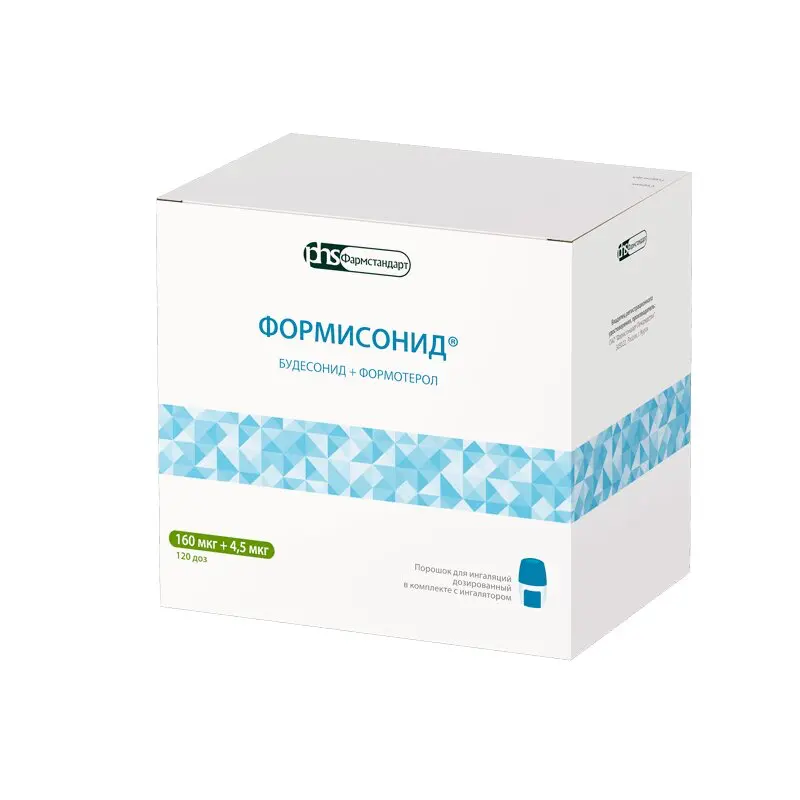Description
Euphylline (Aminophylline) injections are a common treatment for people with breathing problems, such as asthma and chronic obstructive pulmonary disease (COPD). These injections are a quick and effective way to improve breathing and provide relief from symptoms.
Euphylline (Aminophylline) injections Pharmacodynamics
Euphylline (Aminophylline) injections is the ethylenediamine salt of theophylline (which facilitates solubility and increases absorption). It has a bronchodilator effect, apparently due to a direct relaxing effect on the smooth muscles of the airways and blood vessels of the lungs. It is believed that this effect is caused by selective inhibition of the activity of specific FDEs, which leads to an increase in the intracellular concentration of cAMP. The results of experimental studies in vitro show that the main role seems to be played by type III and type IV isoenzymes. Suppression of the activity of these isoenzymes may also cause some side effects of aminophylline (theophylline), including vomiting, arterial hypotension and tachycardia. Blocks adenosine (purine) receptors, which may be a factor in action on the bronchi.
Reduces airway hyperresponsiveness associated with the late phase of the response induced by inhaling allergens through an unknown mechanism that is not related to FDE inhibition or adenosine blockade. There are reports that aminophylline increases the number and activity of T-suppressors in peripheral blood.
It increases mucociliary clearance, stimulates diaphragm contraction, improves respiratory and intercostal muscle function, stimulates the respiratory center, increases its sensitivity to carbon dioxide, and improves alveolar ventilation, which ultimately leads to a reduction in the severity and frequency of apnea episodes. By normalizing respiratory function, it promotes blood oxygenation and decreases carbon dioxide concentration. Enhances lung ventilation in conditions of hypokalemia.
Euphylline (Aminophylline) injections have a stimulating effect on heart activity, increases strength and heart rate, increases coronary blood flow and increases myocardial oxygen demand. Reduces the tone of blood vessels (mainly vessels of the brain, skin and kidneys). It has a peripheral venodilator effect, reduces pulmonary vascular resistance, lowers the pressure in the small circle of circulation. Increases renal blood flow, has a moderate diuretic effect. Dilates extrahepatic biliary tracts. Stabilizes membranes of mast cells, inhibits release of mediators of allergic reactions. Inhibits platelet aggregation (inhibits platelet activation factor and PgE2alpha), increases resistance of red blood cells to deformation (improves rheological properties of blood), reduces thrombosis and normalizes microcirculation. It has a tocolytic effect and increases the acidity of gastric juice. In high doses it has epileptogenic effect.
Indications for Euphylline (Aminophylline) injections
For parenteral use: asthmatic status (adjunctive therapy), neonatal apnea, coronary-type circulatory disorders (in combination therapy), left ventricular failure with bronchospasm and Cheyne-Stokes-type breathing disorders, edema syndrome of renal genesis (in combination therapy); acute and chronic heart failure (in combination therapy).
Oral administration: bronchoobstructive syndrome of various genesis (including bronchial asthma, COPD, including pulmonary emphysema, chronic obstructive bronchitis), hypertension in the small circle of the circulation, pulmonary heart, night-time apnea; acute and chronic heart failure (in combination therapy).
Contraindications
Severe arterial hyper- or hypotension, tachyarrhythmias, gastric and duodenal ulcer in the acute phase, hyperacid gastritis, severe liver and/or renal dysfunction, epilepsy, hemorrhagic stroke, retinal haemorrhage, concomitant use with ephedrine in children, children (under 3 years of age, for prolonged oral forms under 12 years), hypersensitivity to aminophylline and theophylline.
Dosage and administration method
Individual, depending on the indication, age, clinical situation, route and route of administration, and nicotine addiction.


![Theophylline (Theopec) 200 mg - [50 tablets]](https://mediscom.com.co/wp-content/uploads/2025/06/Theopec-200mg-50.webp)
![Salbutamol (Novatron) solution for inhalation 1 mg/ml 2.5 ml - [10 ampoules]](https://mediscom.com.co/wp-content/uploads/2025/06/Novatron-1mg-2.5ml-10-200x200.webp)

![Ipratropium bromide, fenotero (Astmasol neo) aerosol 20 mcg/dose+50 mcg/dose - [200 doses]](https://mediscom.com.co/wp-content/uploads/2025/06/Astmasol-Neo-200-200x200.webp)